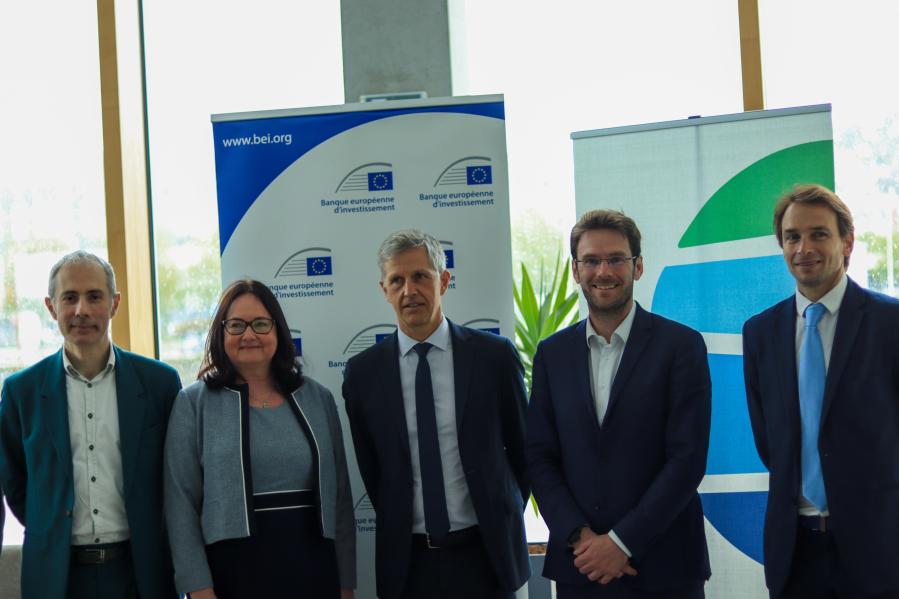
- The €50 million loan will help revitalise the public transport network with zero-emission electric and hydrogen buses and upgrades to passenger information and ticketing systems.
- It aims to overhaul Métropole Rouen Normandie’s bus fleet, promoting an energy transition to low-carbon public transport.
- This project makes a major contribution to the EIB’s objectives under its investment programmes in sustainable cities and regions, and climate and environment.
Métropole Rouen Normandie has taken out a €50 million loan with the European Investment Bank (EIB) to fund its public transport network, with the goal of providing users with more efficient, affordable and environmentally friendly mobility services.
This financing envelope supports several of the Métropole’s sustainable mobility projects, namely the purchase of 114 electric buses and 14 hydrogen buses for public transport services, and the electric retrofit modernisation of 29 buses and 20 coaches for school services. The project also includes upgrading the operating assistance and passenger information system and ticketing for the bus network.
This EIB financing is part of Métropole Rouen Normandie’s mobility plan. The Métropole has a fleet of 450 buses. This included just five electric buses and no hydrogen buses at all in 2020, compared to 77 electric and 14 hydrogen vehicles today. The aim is to reach 237 ultra-low emission buses (electric or hydrogen buses, with no motor emissions) by 2026, over half of the fleet.
This project contributes to the EIB’s investment goals by developing low-carbon public transport infrastructure, presenting passengers with an alternative to private cars.
“We thank the EIB for its clear and steadfast support for our Métropole’s energy transition strategy,” said Mayor of Rouen and President of Rouen Métropole Nicolas Mayer-Rossignol. Vice-President for Transport, Future Mobility and Active Modes of Transport Cyrille Moreau added: “We have made huge investments in low-carbon buses — €166 million during the current mandate — to provide the residents of our 71 municipalities with more efficient, accessible and environmentally friendly public transport.”
“The EIB is supporting regional authorities in their green transitions,” said EIB Vice-President Ambroise Fayolle. “These investments will have a direct, tangible impact on the daily lives of residents and passengers in the Métropole Rouen Normandie area. This shows that EU action can improve people’s quality of life and well-being.”
Background information
About the EIB
The European Investment Bank (EIB) is the long-term lending institution of the European Union, owned by its 27 Member States. It provides loans to the public and private sectors for sound investment contributing to EU policy goals. In 2023, France received more EIB financing for the energy and green transition than any other country, with an overall investment of €6.9 billion for renewable energy, clean mobility and energy efficiency. A partner of regional authorities, last year the EIB directed €2.3 billion in funding to rail and urban public transport and soft mobility, making it the number one sector in terms of EIB investment in France over the year.
About Métropole Rouen Normandie
Nestled in a curve of the river Seine and surrounded by beautiful countryside, Métropole Rouen Normandie has 500 000 residents split across 71 municipalities including its historical, economic and industrial heart — the city of Rouen. The capital of Normandy and a major sea and river port, it lies at the centre of an area home to 800 000 people. The tenth largest Métropole in France, close to Paris and an hour from the sea, it is the region’s largest employment hub (300 000 jobs, 60 000 companies and 45 000 students) and the second biggest local public investor, with an annual budget of nearly €1 billion. Resolutely future-oriented, it is now at the heart of an extremely strong economy and is a pioneering region in the green and social transition. Métropole Rouen Normandie has launched various strategic projects, but is also a local, day-to-day authority, responsible for major public services (transport, water, energy, etc.), supporting its member municipalities. Its rich historical, natural, river and forestry heritage and the major national and international events it is hosting and aims to host (L’Armada, Normandie Impressionniste, European Capital of Culture 2028, etc.) make it an exceptional tourist destination.


